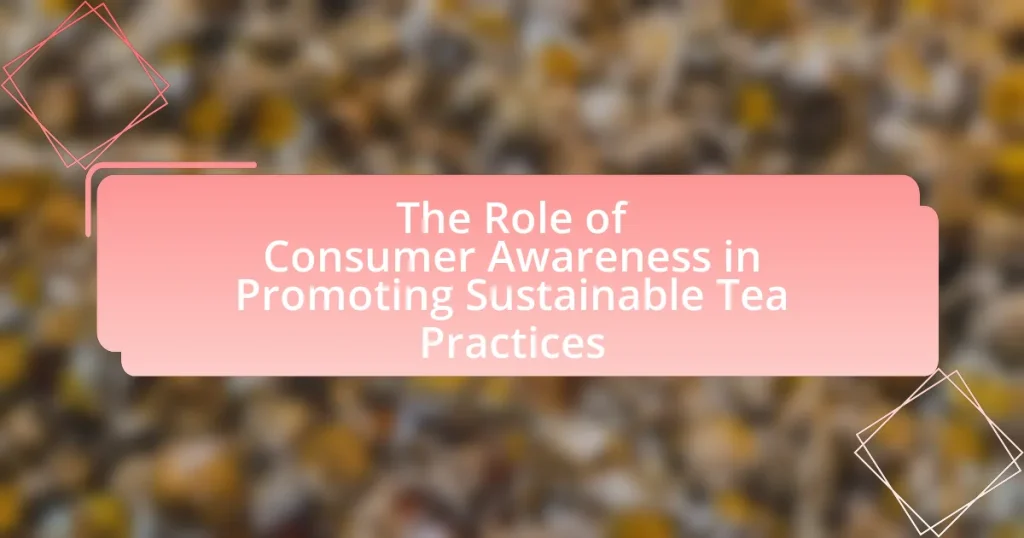The article focuses on the role of consumer awareness in promoting sustainable tea practices. It highlights how informed consumers influence purchasing decisions by favoring brands that prioritize sustainability, such as those with organic or fair trade certifications. Key factors contributing to consumer awareness include product labeling, marketing strategies, and educational initiatives, which collectively drive demand for ethically sourced tea. The article also discusses the environmental benefits of sustainable practices, current trends in consumer preferences, and the challenges consumers face in accessing information about sustainable tea options. Ultimately, it emphasizes the importance of enhancing consumer awareness to foster a more responsible tea industry.

What is the Role of Consumer Awareness in Promoting Sustainable Tea Practices?
Consumer awareness plays a crucial role in promoting sustainable tea practices by influencing purchasing decisions and encouraging ethical production methods. When consumers are informed about the environmental and social impacts of tea production, they are more likely to choose brands that prioritize sustainability, such as those that use organic farming methods or fair trade certifications. Research indicates that 66% of global consumers are willing to pay more for sustainable brands, demonstrating that awareness directly correlates with market demand for sustainable practices. This shift in consumer behavior pressures tea producers to adopt environmentally friendly practices, thereby fostering a more sustainable industry overall.
How does consumer awareness influence sustainable tea consumption?
Consumer awareness significantly influences sustainable tea consumption by driving demand for ethically sourced and environmentally friendly products. When consumers are informed about the environmental and social impacts of tea production, they are more likely to choose brands that prioritize sustainability, such as those that use organic farming practices or fair trade certifications. Research indicates that 66% of global consumers are willing to pay more for sustainable brands, highlighting the direct correlation between awareness and purchasing behavior. This shift in consumer preferences encourages tea producers to adopt sustainable practices to meet market demands, ultimately leading to a more responsible tea industry.
What factors contribute to consumer awareness in the tea industry?
Consumer awareness in the tea industry is primarily influenced by factors such as product labeling, marketing strategies, and educational initiatives. Product labeling, including certifications like organic or fair trade, provides consumers with essential information about the tea’s quality and sourcing practices. Marketing strategies that emphasize sustainability and ethical sourcing resonate with environmentally conscious consumers, driving awareness and preference for sustainable options. Educational initiatives, such as workshops and informational campaigns, further enhance consumer knowledge about the environmental and social impacts of tea production, fostering informed purchasing decisions. These factors collectively contribute to a more informed consumer base that supports sustainable tea practices.
How does consumer awareness impact purchasing decisions for sustainable tea?
Consumer awareness significantly influences purchasing decisions for sustainable tea by increasing demand for ethically sourced products. When consumers are informed about the environmental and social impacts of tea production, they are more likely to choose brands that prioritize sustainability. Research indicates that 66% of global consumers are willing to pay more for sustainable brands, highlighting a direct correlation between awareness and purchasing behavior. Additionally, studies show that consumers who understand the benefits of sustainable practices, such as reduced pesticide use and fair labor conditions, are more inclined to support brands that align with these values. This awareness not only drives sales for sustainable tea but also encourages companies to adopt more responsible practices to meet consumer expectations.
Why is consumer awareness crucial for sustainable tea practices?
Consumer awareness is crucial for sustainable tea practices because it drives demand for environmentally friendly and ethically produced tea. When consumers are informed about the impacts of tea production, such as deforestation, pesticide use, and labor conditions, they are more likely to choose products that adhere to sustainable practices. For instance, a study by the Rainforest Alliance found that 70% of consumers are willing to pay more for sustainably sourced products, indicating that awareness directly influences purchasing decisions. This consumer behavior encourages tea producers to adopt sustainable methods, thereby promoting ecological balance and social responsibility in the industry.
What are the environmental benefits of sustainable tea practices?
Sustainable tea practices significantly reduce environmental impact by promoting biodiversity, conserving water, and minimizing chemical use. These practices often involve organic farming methods that enhance soil health and protect local ecosystems, which in turn supports a diverse range of plant and animal species. For instance, studies have shown that organic tea farms can increase biodiversity by up to 30% compared to conventional farms. Additionally, sustainable practices typically employ efficient water management techniques, reducing water consumption by as much as 50%, which is crucial in regions facing water scarcity. Furthermore, the reduction of synthetic pesticides and fertilizers leads to less soil and water pollution, contributing to healthier ecosystems.
How does consumer awareness drive change in tea production methods?
Consumer awareness drives change in tea production methods by increasing demand for sustainable practices among producers. As consumers become more informed about the environmental and social impacts of tea cultivation, they actively seek products that align with their values, such as organic or fair-trade certifications. This shift in consumer preferences compels tea producers to adopt more sustainable farming techniques, such as reducing pesticide use and implementing fair labor practices, to meet market demands. For instance, a study by the International Institute for Environment and Development found that consumer interest in sustainability led to a 20% increase in the adoption of eco-friendly practices among tea producers in regions like Assam, India.

What are the current trends in consumer awareness regarding sustainable tea?
Current trends in consumer awareness regarding sustainable tea indicate a significant increase in demand for ethically sourced and environmentally friendly products. Consumers are increasingly prioritizing certifications such as Fair Trade and Rainforest Alliance, reflecting a growing understanding of the impact of tea production on ecosystems and communities. According to a 2022 survey by the Tea and Herbal Association of Canada, 70% of consumers expressed a preference for brands that demonstrate sustainability practices, highlighting a shift towards conscious purchasing decisions. This trend is further supported by the rise of social media platforms where consumers actively share information about sustainable brands, fostering a community focused on ethical consumption.
How are consumers becoming more informed about sustainable tea options?
Consumers are becoming more informed about sustainable tea options through increased access to information via digital platforms and social media. Online resources, including blogs, websites, and social media channels, provide insights into sustainable practices, certifications, and the environmental impact of tea production. For instance, organizations like the Rainforest Alliance and Fair Trade offer detailed information on sustainable sourcing, which consumers can easily access. Additionally, consumer demand for transparency has led brands to disclose their sourcing practices and sustainability efforts, further educating buyers. Research indicates that 66% of global consumers are willing to pay more for sustainable brands, highlighting the growing awareness and preference for eco-friendly options in the tea market.
What role do social media and marketing play in raising awareness?
Social media and marketing are crucial in raising awareness by effectively disseminating information and engaging audiences. They leverage platforms with billions of users to share messages about sustainable practices, reaching diverse demographics quickly. For instance, a study by the Pew Research Center indicates that 69% of adults in the U.S. use social media, making it a powerful tool for spreading awareness about sustainable tea practices. Additionally, targeted marketing campaigns can highlight the environmental benefits of sustainable tea, influencing consumer behavior and encouraging responsible purchasing decisions. This combination of broad reach and targeted messaging enhances public knowledge and fosters a culture of sustainability.
How do certifications and labels affect consumer perceptions of sustainability?
Certifications and labels significantly enhance consumer perceptions of sustainability by providing credible evidence of environmentally friendly practices. Research indicates that consumers are more likely to trust products with recognized certifications, such as Fair Trade or Rainforest Alliance, as these labels signal adherence to specific sustainability standards. A study published in the Journal of Consumer Research found that 66% of consumers are willing to pay more for products with sustainability certifications, demonstrating that these labels influence purchasing decisions and foster a positive perception of a brand’s commitment to sustainability.
What challenges do consumers face in becoming aware of sustainable tea practices?
Consumers face several challenges in becoming aware of sustainable tea practices, primarily due to a lack of accessible information and transparency in the tea industry. Many consumers struggle to find reliable sources that clearly outline what constitutes sustainable practices, as certifications can vary widely and may not always be clearly communicated on packaging. Additionally, the complexity of supply chains makes it difficult for consumers to trace the origins of their tea and understand the environmental and social impacts associated with its production. Research indicates that only 30% of consumers are aware of sustainability certifications, highlighting a significant gap in knowledge that hinders informed purchasing decisions.
What misinformation exists about sustainable tea practices?
Misinformation about sustainable tea practices includes the belief that all organic teas are automatically sustainable. While organic farming avoids synthetic pesticides and fertilizers, it does not guarantee sustainable practices such as water conservation or fair labor conditions. Additionally, some consumers mistakenly think that all tea labeled as “sustainable” meets rigorous environmental standards, when in fact, certifications vary widely in their criteria and enforcement. For instance, the Rainforest Alliance certification may not address all aspects of sustainability, leading to confusion among consumers regarding the true impact of their tea choices.
How can consumers overcome barriers to accessing information on sustainable tea?
Consumers can overcome barriers to accessing information on sustainable tea by utilizing online resources, engaging with community initiatives, and seeking transparency from brands. Online platforms such as sustainability-focused websites and social media groups provide valuable insights and discussions about sustainable tea practices. Community initiatives, like local workshops or farmer’s markets, often feature educational sessions that enhance consumer knowledge. Additionally, consumers can directly inquire about sourcing and production practices from tea brands, as companies increasingly prioritize transparency to meet consumer demand for sustainability. Research indicates that informed consumers are more likely to support sustainable practices, thereby driving industry change.

How can consumer awareness be enhanced to promote sustainable tea practices?
Consumer awareness can be enhanced to promote sustainable tea practices through targeted education campaigns and transparent labeling. Educational initiatives can inform consumers about the environmental and social impacts of tea production, highlighting the benefits of sustainable practices such as organic farming and fair trade. For instance, a study by the International Tea Committee found that consumers are more likely to choose sustainably produced tea when they understand its positive effects on ecosystems and communities. Additionally, clear labeling that indicates sustainability certifications can guide consumers in making informed choices, as research shows that 66% of consumers are willing to pay more for products that are sustainably sourced.
What strategies can be implemented to improve consumer education on sustainable tea?
To improve consumer education on sustainable tea, implementing targeted awareness campaigns is essential. These campaigns can utilize social media platforms to disseminate information about the environmental and social impacts of tea production, highlighting certifications like Fair Trade and Rainforest Alliance. Research indicates that consumers are more likely to purchase products with recognized sustainability labels, as seen in a study by the International Institute for Environment and Development, which found that 70% of consumers prefer certified products. Additionally, organizing workshops and tastings can engage consumers directly, allowing them to experience sustainable tea options firsthand. This experiential learning can reinforce the importance of sustainability in their purchasing decisions.
How can tea brands effectively communicate their sustainability efforts?
Tea brands can effectively communicate their sustainability efforts by utilizing transparent labeling, engaging storytelling, and leveraging digital platforms. Transparent labeling allows consumers to easily identify sustainable practices, such as organic certifications or fair trade status, which enhances trust. Engaging storytelling about the sourcing of tea leaves, the communities involved, and the environmental impact of their practices can create an emotional connection with consumers. Additionally, leveraging digital platforms, including social media and websites, enables brands to share real-time updates on sustainability initiatives, such as carbon footprint reduction or waste management efforts. Research indicates that 66% of consumers are willing to pay more for sustainable brands, highlighting the importance of clear communication in driving consumer awareness and preference for sustainable tea practices.
What role do educational campaigns play in promoting sustainable tea practices?
Educational campaigns play a crucial role in promoting sustainable tea practices by increasing consumer awareness and encouraging responsible purchasing decisions. These campaigns educate consumers about the environmental and social impacts of tea production, highlighting the importance of choosing sustainably sourced products. For instance, research by the Rainforest Alliance indicates that consumer awareness initiatives can lead to a 20% increase in the purchase of certified sustainable tea products. By informing consumers about certifications, such as Fair Trade and Rainforest Alliance, educational campaigns empower them to support practices that protect ecosystems and improve the livelihoods of tea farmers.
What practical steps can consumers take to support sustainable tea practices?
Consumers can support sustainable tea practices by choosing certified organic and fair trade tea brands. These certifications ensure that the tea is grown without harmful pesticides and that farmers receive fair wages, promoting environmental and social sustainability. For instance, the Fair Trade certification requires adherence to strict environmental and labor standards, which helps protect ecosystems and improve the livelihoods of tea producers. Additionally, consumers can reduce waste by opting for loose-leaf tea instead of tea bags, which often contain plastic. By making informed purchasing decisions, consumers can significantly impact the sustainability of the tea industry.
How can consumers identify and choose sustainable tea brands?
Consumers can identify and choose sustainable tea brands by looking for certifications such as Fair Trade, Rainforest Alliance, or USDA Organic, which indicate adherence to environmental and social standards. These certifications ensure that the tea is produced with sustainable farming practices, fair labor conditions, and minimal environmental impact. Additionally, consumers can research brands that provide transparency about their sourcing and production processes, often found on their websites or product packaging. Brands that engage in ethical practices, such as supporting local communities and using eco-friendly packaging, further demonstrate their commitment to sustainability.
What are the benefits of supporting local and ethical tea producers?
Supporting local and ethical tea producers enhances community economies and promotes sustainable agricultural practices. By purchasing tea from these producers, consumers contribute to local job creation and ensure fair wages for farmers, which can lead to improved living standards. Additionally, ethical tea production often involves environmentally friendly practices, such as organic farming and reduced pesticide use, which help preserve biodiversity and soil health. Research indicates that local producers are more likely to engage in sustainable practices, as they are directly connected to their communities and the land. This connection fosters a commitment to quality and sustainability, benefiting both consumers and the environment.


